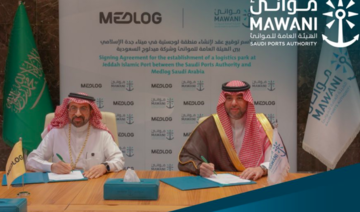RIYADH: Eight new Saudi companies have joined MSCI’s global and small capital indexes, highlighting the Kingdom’s growing influence on the international investment landscape.
According to an official document, the financial solution provider has included SAL Saudi Logistics Services Co. in the MSCI Global Standard Index.
MSCI has also added seven stocks to the Small Cap Index, including Al-Babtain Power & Telecommunication, Etihad Atheeb Telecom, and the Mediterranean and Gulf Insurance and Reinsurance Group.
Additional inclusions comprised Middle Mast Pharmaceutical Industries Co., known as Avalon Pharma, Saudi Advanced Industries Co., Saudi Paper Manufacturing Co., and Walaa Cooperative Insurance Co.
Conversely, MSCI has removed six companies from the Small Cap Index: Amlak International for Real Estate Development & Finance Co., known as Amlak, Fawaz Abdulaziz Al Hokair & Co., known as Cenomi Retail, Methanol Chemicals Co., and Riyad REIT.
Additionally, Saudi Co. for Hardware and Saudi Arabian Refineries Co. have also been excluded.
As a result, the number of Saudi companies listed on the Small Cap Index now stands at 80, while the Global Standard Index includes 41 companies. MSCI stated that these changes will be implemented at market close on May 31.
The Saudi companies included in the MSCI Global Standard Index reflect the diverse and robust economic landscape of the Kingdom, with the oil giant Aramco leading the list.
The banking sector is represented by Al-Rajhi Bank, Riyad Bank, and Alinma Bank. It also includes Bank AlJazira, Bank AlBilad, and Saudi French Bank, as well as National Commercial Bank, SABB, and Saudi Investment Bank.
Industrial and petrochemical giants such as SABIC, Advanced Petrochemical, and Saudi Basic Industries Corp., as well as SABIC Agri-Nutrients, Kayan, Yansab, and Ma’aden, feature prominently in the global index, underscoring the Kingdom’s leadership in these fields. Telecommunications and technology are highlighted by stc and solutions by stc.
The healthcare sector includes Bupa Arabia for Cooperative Insurance Co., Dr Sulaiman Al Habib Medical Services Group Co., and Al-Mouwasat, as well as Dallah Healthcare, and Al-Nahdi Medical Co.
Retail and consumer goods are represented by Jarir Marketing Co., Almarai Co., and Savola Group, while the energy sector features Saudi Electricity Co., ACWA Power, and Power and Water Utility Co. for Jubail and Yanbu.
Additional key players include Saudi Research and Media Group, known as SRMG, Tadawul Group, and Luberef. The list also features the Co. for Cooperative Insurance, ADES Holding Co., and SAL Saudi Logistics Services Co., illustrating the wide-ranging and dynamic nature of Saudi Arabia’s corporate environment.
The Saudi companies in the MSCI Small Cap Index also represent diverse sectors, including Saudi Cement, Ataa Educational Co., Al-Rajhi Takaful, eXtra, and Arriyadh Development Co., known as Tameer.
MSCI stands as a premier provider of essential decision support tools and services for the worldwide investment community, according to its website.




















